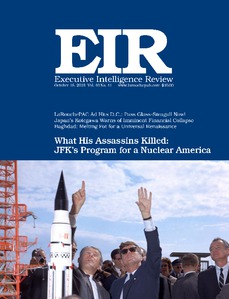What His Assassins Killed: John F. Kennedy’s Program for a Nuclear America
Michael Kirsch of the LaRouche science team presents the little-known story of President Kennedy’s nuclear power program, which included rapid expansion of nuclear power, including fast-breeders; nuclear desalination of seawater for the benefit of the world; a nuclear-powered rocket for space exploration; infrastructure development for water and electricity, such as the North American Water and Power Alliance (NAWAPA), using peaceful nuclear explosions for rapid and efficient digging of large-scale projects. Where would this country be today, if Kennedy’s program had not been aborted? The LaRouche movement is organizing to revive it today, under the broader international concept of NAWAPA XXI.
JFK Refuted Malthus
by Michael Kirsch and Anton Chaitkin
Economics
Japan’s Kotegawa Warns of Imminent Financial Collapse
Japanese economist Daisuke Kotegawa, a former executive director for Japan at the IMF and a supporter of the U.S. restoration of the Glass-Steagall Act, warns of “a financial catastrophe, accompanied by a global collapse,” even in the immediate weeks ahead.
Eyewitness Report, Part 2: To Rescue Greece, the U.S. Must Return to Glass-Steagall
by Andrea Andromidas and Dean Andromidas
Andrea and Dean Andromidas report on their impressions of Athens under the Troika’s austerity regime, and their discussions with political leaders, activists, scientists, engineers, and economists.
Empire’s Limes Policy Turns Mediterranean into a Cemetery
LaRouche PAC Revives Dialogue with Mexico on Fusion Energy
National
LaRouche PAC Ad Hits D.C.: Pass Glass-Steagall Now!
While President Obama and most members of Congress continue to haggle over ever-more-draconian cuts in the living standards of Americans, LaRouche PAC has taken out an ad in the Capitol Hill newspaper, The Hill, stating that, “It is time for Congress to break with Wall Street banksters, their stooge in the White House, and their stooges on Capitol Hill;” the ad has been endorsed at press time by 45 leading individuals.
Top Banker-Spokesman Discloses ‘Shutdown’ Aim: Kill Off Old Folks
by Edward Spannaus
American Bankers Association president Frank Keating lays out the agenda behind the government shutdown: Cut Social Security and Medicare, because Americans are living too long.
Book Review: It Was FDR’s Bretton Woods!
by J.P. Rubinstein
The Battle of Bretton Woods: John Maynard Keynes, Harry Dexter White, and the Making of a New World Order, by Benn Steil.
International
China’s Silk Road Diplomacy: Lifeline for U.S. Economy
by William Jones
The potential created by the Chinese policy represents an auspicious development in the Asia-Pacific region, with which any sane U.S. administration would seek to collaborate.
Central Asia, Kashmir Face New Jihadi Threat; Concerns in Russia
by Ramtanu Maitra
British-Saudi terror networks are redeploying and expanding their reach with the winding down of the U.S./NATO war in Afghanistan.
African Union Summit Lambastes ICC
by Douglas DeGroot
Kenyatta: ICC a Toy of Western Imperial Powers
by Douglas DeGroot
History
Baghdad 767-1258 A.D.: Melting Pot for a Universal Renaissance
by Hussein Askary
From its conception in the mind of the Abbasid Khalifa Abu Jaafar Al-Mansour in 767 A.D., until the day of its first destruction by the Venice-allied Mongol hordes in 1258, Baghdad was the cradle of a historical scientific and cultural renaissance, and a melting pot of a rich Islamic-Christian-Jewish-Arab-Persian-Greek-Indian collaboration. Like every great renaissance movement, it started with the gathering, translation, and assimilation of the best works produced by other great cultures and individuals. Hussein Askary reports on the legacy that needs to be revived today, in modern form.
Banu Musa: The Sons of Musa ben Shaker
Editorial
Glass-Steagall, To Stop Genocide



